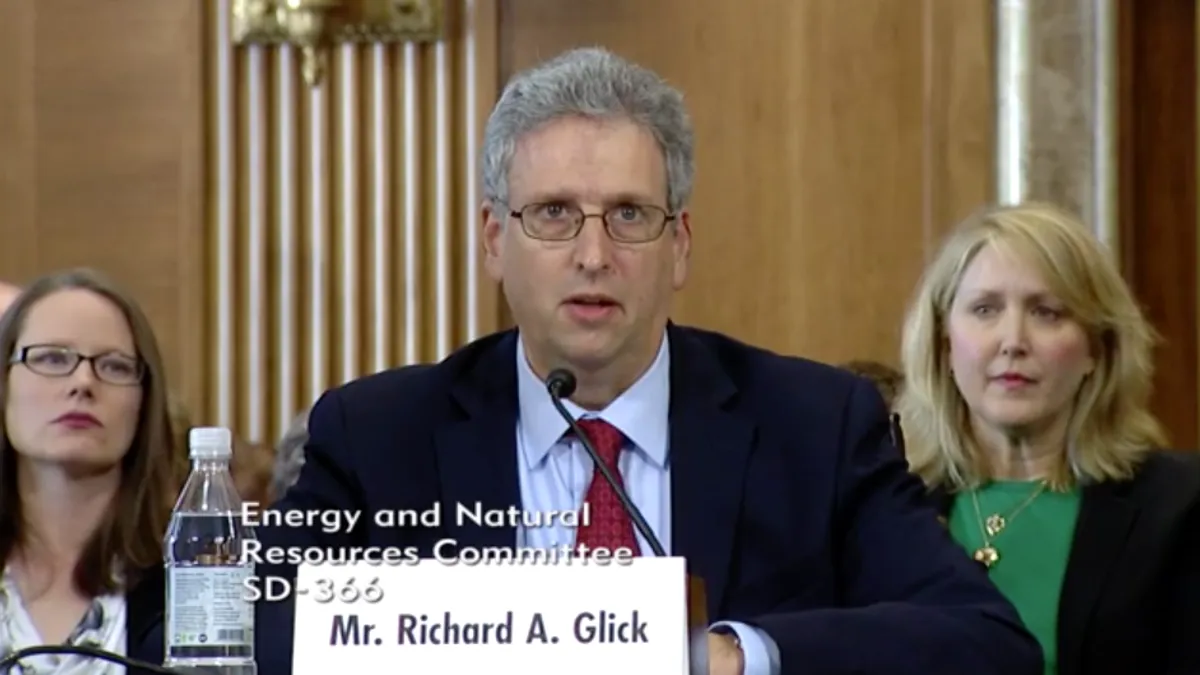Dive Brief:
-
Federal Energy Regulatory Commission Chair Richard Glick on Thursday called on Congress and the Texas state legislature to "rethink" the state's grid operator's "go it alone approach" in the wake of rolling blackouts experienced across the region this week.
-
The Electric Reliability Council of Texas (ERCOT) is regulated by the Texas Public Utilities Commission, not by FERC. Former Governor of Texas and Secretary of Energy Rick Perry said this week that "Texans would be without electricity for longer than three days to keep the federal government out of their business," according to a blog post published on House Minority Leader Kevin McCarthy's website, which added Perry's comments were made "partly rhetorically."
-
FERC and the North American Electric Reliability Corporation (NERC) opened an inquiry earlier this week to assess what went wrong across the region, and it remains to be seen whether ERCOT's model had anything to do with the outages, said Glick. But it seems like "common sense" that grid operators "in a bind," as ERCOT was this week, may want to reassess their models, he added.
Dive Insight:
ERCOT is not federally regulated because it does not trade significant amounts of power across state lines, unlike other grid operators that operate across multiple states and are able to trade power regionally, through the Eastern and Western Interconnections. There is some debate over whether it's still appropriate for ERCOT to follow this model, given the potential for greater power sharing with its neighbors.
"There could be advantages to having them connect to the Southwest Power Pool, to the north, and [the Midcontinent Independent System Operator (MISO)] South, to the east," said Alex Gilbert, a fellow at the Colorado School of Mines' Payne Institute of Public Policy. But in terms of this week's outages, it's unlikely that having greater interconnection would have helped, he said, because MISO and SPP were under their own generation constraints at the same time.
"There really wasn't a lot of spare capacity that they could have imported," said Gilbert. "Now, in the long term, if we have some sort of large [high voltage, direct current (HVDC)] national grid where there's a lot of electricity, that would be different."
The Department of Energy's National Renewable Energy Laboratory seam study examines such a hypothetical, finding that trading power across the Eastern and Western interconnections could allow more renewable energy to travel cross-country, offering more reliability and cost savings. But the question of whether Texas' grid would or should be included is still up in the air, said Gilbert.
Although FERC has no role in deciding whether ERCOT maintains its same model or moves under FERC jurisdiction, Glick said being connected to the rest of the grid could "certainly" enhance reliability, and perhaps would have even alleviated some of the issues from the past week, though it's too early to say for sure.
"Does it really makes sense to isolate yourself and limit your ability to get power from neighboring regions, just to keep FERC at bay?" he said. "That strikes me as the proverbial cutting off your nose to spite your face."
Another difference between ERCOT and other grid operators, is that the Texas grid operator does not run a capacity market, meaning there is no mandatory capacity mechanism, but instead incentivizes units to remain online for extra capacity through scarcity pricing. It's not yet clear whether a capacity market would have made a difference, and Glick's initial assessment, based on press reports, is that capacity was not the issue.
"It wasn't that [ERCOT] had a capacity problem," he said. "They had plenty of capacity — capacity that wasn't working. They had an energy problem. … So for those folks who are saying 'Let's go to a capacity market approach,' I think they need at least at least investigate and consider whether that really would have helped matters or not."
Glick also acknowledged Perry's comments, saying that allowing Texans to go without power just to refuse federal help does not seem like a "wise approach."
"I've had some concerns about what FERC has done too, but I don't think that's really a wise approach," he said. "I'd rather that we figure out a way to work together to help Texas deal with whatever reliability issues they may have in the future."
Commissioner James Danly during Thursday's meeting seemed to caution the chairman and other commissioners against interfering too much in Texas' policies, pointing to arguments Glick and others have made against FERC inhibiting state clean energy policies.
"When it comes to ERCOT and its separation from the rest of the country, it is my ... fervent hope that my colleagues will show the solicitude to Texas that they often seem willing to afford all of the other states in pursuing their policy goals," he said. "I see no reason to change ERCOT's status, unless Texas itself wants to."
Texas Gov. Greg Abbott, R, earlier this week directed the state's legislature to conduct its own investigation into ERCOT.
"Reviewing the preparations and decisions by ERCOT is an emergency item so we can get a full picture of what caused this problem and find long-term solutions," Abbott said in a statement.















